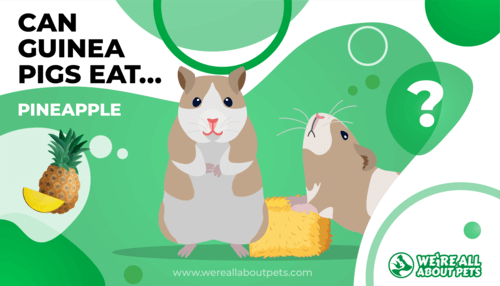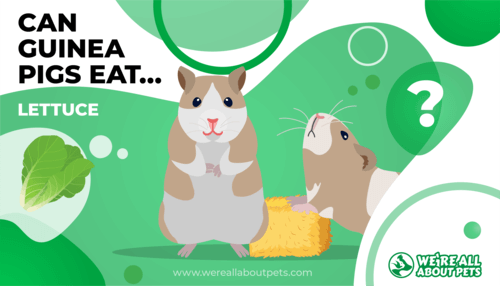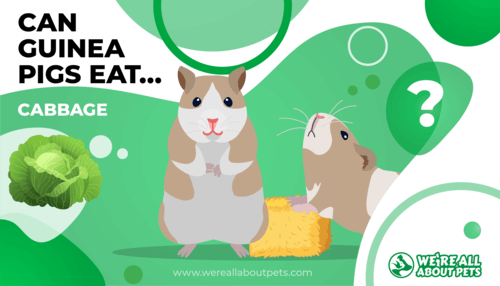Can Guinea Pigs Eat Mushrooms?
This page contains affiliate links. We may earn money or products from the companies mentioned in this post through our independently chosen links, which earn us a commission. Learn More
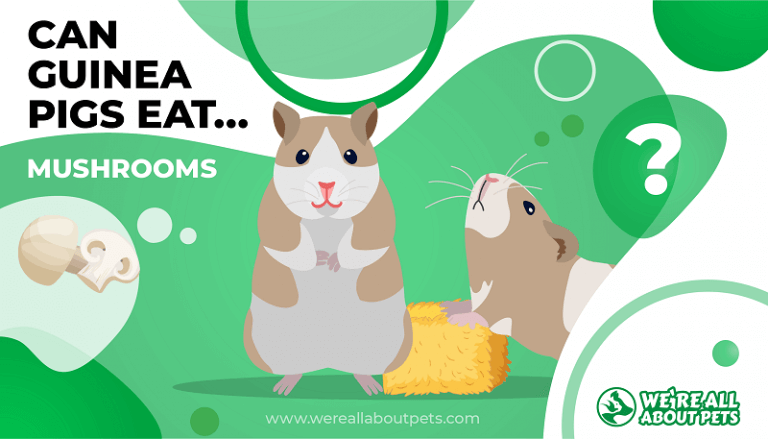
Many people love mushrooms – after all, they’re delicious on a variety of foods!
If you like these tasty fungi, you’re probably wondering if guinea pigs can eat mushrooms.
The quick answer to your question is yes, but don’t hop away just yet: as it turns out, only certain kinds of mushrooms are okay for guinea pigs.
Stick with us, because we’re about to answer all of your questions about mushrooms for guinea pigs.
Mushroom Nutritional Facts
Not only are mushrooms yummy, you can have quite a few without sacrificing your daily calorie budget.
A 1 cup serving of sliced white mushrooms provides about:
- 15 calories
- 3 g carbohydrates
- 7 g fiber
- 2 g protein
- .2 g fat
Mushroom Nutrition Stats
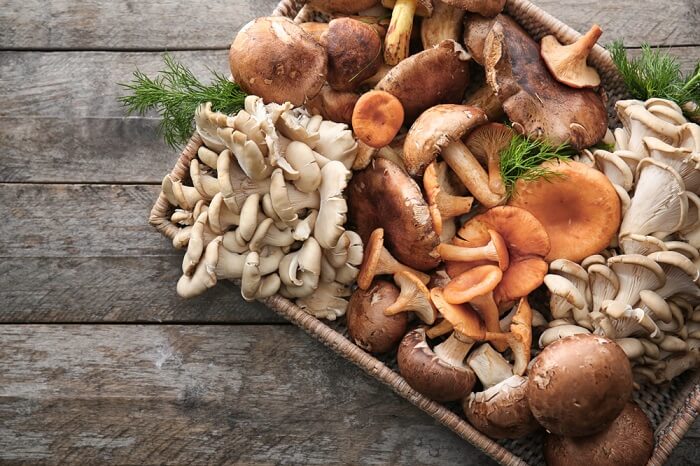
Mushrooms might not be the most nutritious thing on the planet – but they do offer some essential nutrients including zinc and vitamin D.
That same 1 cup serving of sliced white mushrooms gives you approximately:
- 6 IU vitamin D
- 5 mg vitamin C
- 5 mg niacin
- 2 mcg folate
- 1 mg choline
- 1 mg calcium
- 3 mg magnesium
- 2 mg phosphorus
- 223 mg potassium
- .4 mg zinc
- .2 mg copper
- 5 mcg selenium
Can Guinea Pigs Have Mushrooms?
Yes and no! It all depends on the kind of mushroom you’re considering for your guinea pig.
White button mushrooms, baby Bella mushrooms, and portobello mushrooms are okay for guinea pigs.
Never give a guinea pig wild mushrooms as these can be toxic. Even wild mushrooms that are safe for humans to meet can be poisonous to guinea pigs.
There’s one more thing you should know about mushrooms for guinea pigs: Guinea pigs can only eat raw mushrooms. Never give cooked mushrooms to guinea pig.
Are Mushrooms Good For Guinea Pigs?
Since guinea pigs can only eat a small amount of mushroom and as mushrooms are not nutrient-dense, they really don’t offer any benefits to your guinea pig. At the same time, the nibble of common culinary mushroom won’t do your guinea pig any harm.
Do Guinea Pigs Like Mushrooms?
Some guinea pigs will try mushrooms and enjoy them, while others aren’t even remotely interested.
The best way to find out if your guinea pig likes mushrooms is to go ahead and offer your pet a tiny slice of white button mushroom and see how they respond!
How Much Mushroom Can A Guinea Pig Eat?
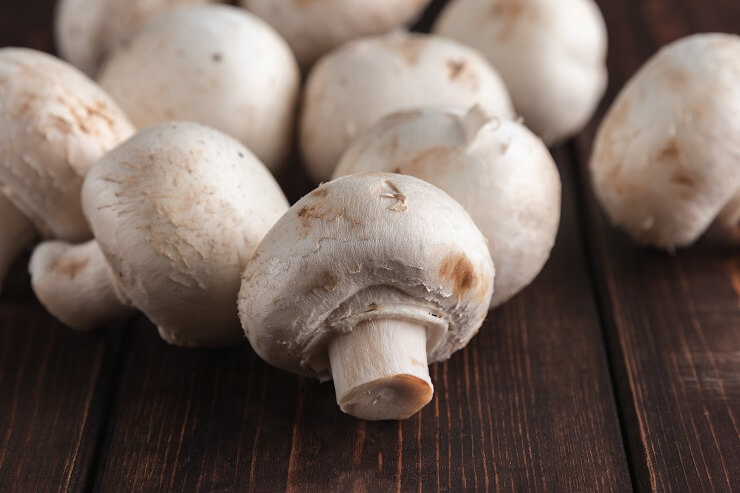
Good question! The answer is “Not much!”
Since mushrooms really aren’t part of the guinea pig’s natural diet, it’s important not to overdo it.
Here’s how much mushroom to feed a guinea pig.
| Age | Amount |
| Baby guinea pig | None |
| Adult guinea pig | 1 slice of white mushroom or baby bella mushroom, or a ½” cube of portabella mushroom |
Anytime you give your guinea pig a new food, it’s important to monitor them to ensure that they haven’t had a bad reaction. Sudden dietary changes can disrupt the balance in your guinea pig’s intestinal flora, and this can be a real problem.
After your guinea pig eats mushroom for the first time, keep an eye on them for about 12 hours just to make sure that they don’t have any unwanted side effects such as bloating, discomfort, or diarrhea.
Even though none of this is likely when you offer just one tiny piece of mushroom, the possibility always exists.
If your guinea pig seems sick after having eaten a tiny bit of mushroom, call your vet for specific advice. It’s safe to say that motion didn’t agree with your guinea pig and you should never give it to them again.
How Often Can A Guinea Pig Eat Mushrooms?
Since mushrooms don’t provide any real benefits to your guinea pig, make them an occasional treat. It’s okay to give mushroom to your guinea pig once per week or less.
The Correct Diet Is Important
Given the opportunity, your pet would love to eat the same thing wild guinea pigs eat: A well-rounded diet consisting mainly of small, low-growing plants and lots of wild grasses.
Your guinea pig would have no trouble digesting this diet either – after all, domestic guinea pigs and wild cavies share the same type of digestive system!
When it comes to diet, guinea pigs have simple but specific needs. Here are our recommendations for feeding your guinea pig:
Start by giving them an unlimited amount of fresh, guinea pig-safe hay. The fiber in the hay does the same job wild grass does: It mobilizes your guinea pig’s digestive system. It also helps promote good dental health.
- Offer a daily serving of vitamin C-enriched guinea pig food. Since serving size varies by brand, double-check the label to see how much to feed your guinea pig.
- Give your guinea pig a “salad” consisting of one cup of leafy greens and a few different crunchy vegetables every day. It’s OK to give your guinea pig a tiny bit of fruit as a special treat, too.
- Like all mammals, guinea pigs need unlimited access to fresh, clean water. Rinse and refill your guinea pig’s drinking bottle every day.
Your pet needs just a couple of additional things for good health and a happy life:
Since guinea pigs spend most of their time safely away from predator and other dangers – usually inside a cage – they simply do not have the ability to chew woody plants like the ones their wild cousins encounter over the course of each day.
Here’s something every guinea pig guardian needs to know: A guinea pig’s teeth never stop growing and it’s up to us to provide the means to prevent overgrowth, which could lead to serious pain and perhaps even cause an infection.
You don’t have to do much to accomplish this essential goal. Just make sure that your guinea pig always has safe, chewable items. Things like hay cubes, softwood sticks, and other guinea pig toys keep your cavy chewing and help maintain proper tooth length. These items also give your guinea pig a way to stay busy, preventing the stress and anxiety that comes with boredom.
What Are Some Healthy Alternatives To Mushrooms In A Guinea Pig’s Diet?
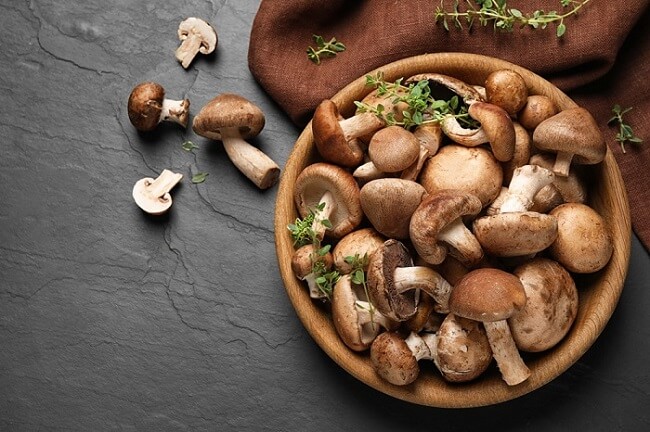
Guinea pigs thrive when their diet offers plenty of variety, so it’s important to make sure your cavy gets lots of different veggies, herbs, and fruits.
Here are some guinea pig-approved suggestions to help you get started:
- arugula
- dill
- asparagus
- carrot
- carrot tops
- basil
- beet
- beet tops
- cilantro
- Swiss chard
- parsley
- pear
- broccoli
- cauliflower
- green bean
- bok choy
- yu choy
- cabbage
- green leaf lettuce
- Bibb lettuce
- Brussels sprouts
- Romaine lettuce
- zucchini
- pumpkin
- summer squash
- Winter squash
- papaya
- apples
- bananas
- blueberries
This is just a sampling – most of the fruits, veggies, and herbs we humans enjoy can also be shared with our cavies.
Of course there are some exceptions, which is why it’s so important to take a few minutes to research each new item you consider for your pet. This way, you’ll avoid foods that are toxic to guinea pigs as well as items that aren’t good for them, or that pose another type of problem such as a choking hazard.
Now that you’ve done your homework, why not try giving your guinea pig mushroom (just a tiny bit!) It’ll be interesting to see whether they like the flavor, or if they’d rather have something else.
Frequently Asked Questions
Are mushrooms safe for guinea pigs?
Yes – it's safe to give mushrooms to guinea pigs so long as you stick to very mild domestic varieties including white button mushrooms, cremini (baby bella) mushrooms, and portabella mushrooms.
Can mushrooms make my guinea pig sick?
Yes, certain mushrooms are toxic to guinea pigs. You don’t want to experiment on your pet so only offer very mild-flavored culinary mushrooms. Avoid gourmet mushrooms such as chantrelles, shiitakes, and oyster mushrooms, and never give your guinea pig wild mushrooms.
Call your vet if your guinea pig ate mushrooms that might not be safe, or if they seem to be having a bad reaction to anything they’ve eaten. A veterinarian will be able to help you determine what to do next.






